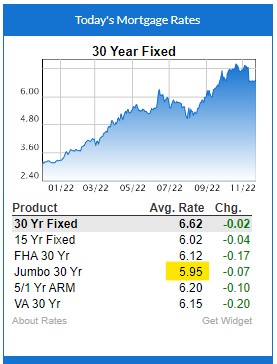Why mortgage interest rates may go down
Boston Condos for Sale and Rent
Why mortgage interest rates may go down
- The average contract interest rate for 30-year fixed-rate mortgages with conforming loan balances ($726,200 or less) decreased last week to 7.61% from 7.86%
- Applications to refinance a home loan increased 2% for the week and were 7% lower than the same week one year ago.
Mortgage rates saw the biggest one-week drop in over a year last week, causing the first increase in mortgage demand in a month.
Total mortgage application volume rose 2.5% last week, compared with the previous week, according to the Mortgage Bankers Association’s seasonally adjusted index.
“Last week’s decrease in rates was driven by the U.S. Treasury’s issuance update, the Fed striking a dovish tone in the November FOMC statement, and data indicating a slower job market,” said Joel Kan, vice president and deputy chief economist at the MBA.
Applications to refinance a home loan increased 2% for the week and were 7% lower than the same week one year ago. Mortgage rates are pretty close to where they were at this time last year, so there is not a lot of incentive to refinance. Most homeowners refinanced two years ago when rates were hovering near record lows. The vast majority of current homeowners carry mortgages with rates below 4%.
Applications for a mortgage to purchase a home rose 3% for the week but were 20% lower than the same week a year ago. The decline in interest rates is still not enough to offset sky-high home prices, which are still rising due to the very low supply of houses for sale.
Mortgage rates started the week slightly higher, but this week holds fewer economic events or reports that would influence rates. Last week’s combination of the Federal Reserve keeping interest rates unchanged and a lower-than-expected monthly employment report was the perfect storm for the dramatic move lower in rates.
______________________________________________________________________________________________

Will the 30-yr jumbo rate stay in the 5s? Here’s what MND says:
Mortgage rates plummeted in response to the November 10th CPI data, they’ve been as flat as we’ve seen in 2022.
This is the goal for financial markets and mortgage rates as they traverse a time frame like the Thanksgiving holiday, but it’s also a byproduct of relevant events. Specifically, inflation data dominates the landscape. It was no surprised to see a big reaction to the CPI data 2.5 weeks ago, and markets may largely be waiting for the next installment before the next substantial shift in rates.
This doesn’t mean rates will remain as flat as they have been–only that they may resist moving too far in either direction until they have more guidance from economic data and the Fed. This week will bring some of that economic data, but the next CPI report arrives on December 13th followed a day later by the next Fed announcement.
Fed speakers were making the rounds today reminding markets that there are more rate hikes to come. The Fed sees the strength of the jobs market as providing a cushion to be aggressive in its fight against inflation.
While the Fed will almost certainly continue to hike rates on the 14th (probably by 0.50%), financial markets have long since baked that assumption into current trading levels. That means today’s mortgage rates already account for the current Fed Funds Rate forecasts.
Even then, the Fed Funds Rate doesn’t dictate mortgage rates and is an imperfect indicator for rate momentum. Longer term rates like mortgages and 10yr Treasury yields typically begin falling sooner and by larger amounts in any given rate cycle. The past few weeks could be the first phase of that typical pattern (10yr Treasuries have dropped 0.30% versus 2yr Treasuries since then), but again, the continuation of that pattern depends on confirmation from upcoming inflation data.

Covid Omicron worries push mortgage rates down
Fears of an economic fallout are causing long-term U.S. mortgage rates to fall as the newest COVID-19 strain reignites worry among Americans.
The average rate on the benchmark 30-year fixed-rate mortgage dipped to 3.05% for the week ended Dec. 23, down from 3.12% the previous week, according to Freddie Mac’s Primary Mortgage Market Survey. The 30-year fixed-rate mortgage averaged 2.66% during the same period in 2020.
Fifteen-year fixed-rate mortgages fell to 2.3% from 2.34% last week.
Rates fell despite unusually high inflation because financial markets are worried that Omicron will weigh on economic growth by forcing lockdowns and cancellations.
“The market volatility resulting from the COVID-19 Omicron variant is causing mortgage rates to decrease,” said Sam Khater, chief economist for Freddie Mac. “As the year comes to a close, the housing market is proceeding steadily. However, rates are expected to increase in 2022, which will impact home-buyer demand as well as refinance activity.”